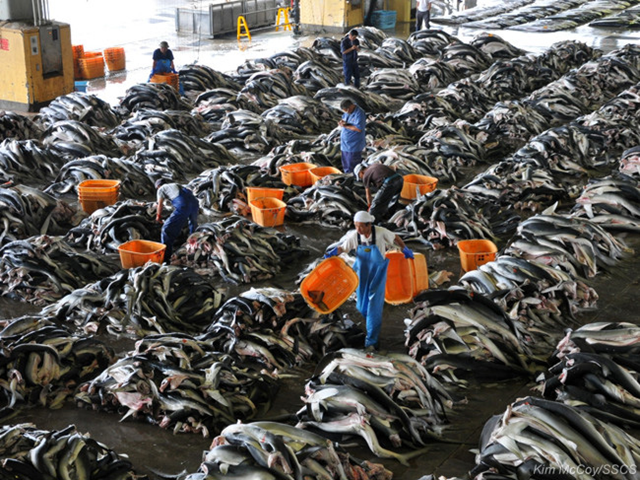Japan to ignore fishing ban on endangered sharks – ‘We use more sharks than anyone else in the world!’
By Gary Stokes, Director, Sea Shepherd Hong Kong
18 June 2013 (SeaShepherd.org) – Recently Japan announced that despite the decision to protect five shark species at the CITES CoP16 meeting held in Bangkok this past March, it is entering a “reservation” (i.e., it will be ignoring the ruling) as it does not recognize the United Nations CITES as a body that should be managing species from the sea. Last time I checked, an endangered species is an endangered species, regardless of where it lives, but Japan and several other rogue nations such as Singapore, believe that CITES should ‘not get involved’ and the management of our fisheries should be left to RFMOs (Regional Fishery Management Organizations). The argument from most NGOs and scientists is that if the RFMOs were doing such a good job at managing their fisheries, the species would never need to be proposed to CITES for protection status. I was at the CITES CoP16 meeting in Bangkok representing Sea Shepherd, and as I reported earlier I was astounded at the way business was being conducted by several member nations. When it comes to the global slaughter of sharks the spotlight always turns to China, the world’s largest consumers of the infamous Shark Fin Soup. However, something didn’t quite add up whilst at CITES. The Chinese delegation, whilst obviously against the shark proposals, was dignified and passive in their lobbying. They engaged in side meetings held by the anti-shark fin groups and raised some valid points. Japan on the other hand was frantically running about, doing deals with other countries to secure their vote of support, almost as if their lives depended on it. When the vote went against them, I was half expecting some of the delegates to fall onto their swords, but the noble samurai culture obviously didn’t extend to the Japanese CITES Delegation. Strangely at CITES, signatory countries can enter what’s known as a ‘reservation’ if a vote doesn’t go their way! This basically indicates to the rest of the world that they will not follow the decisions that everyone voted on, sadly making CITES impotent in the eyes of many. Japan’s recent “reservation” is further evidence that the shark problem is as much a Japanese issue as a Chinese one. Despite Japan’s “reservation,” China pleasantly surprised the world with the following statement; “China has advised the CITES Secretariat that, while it opposed the inclusion of these shark species in the CITES Appendices at CoP16 and continues to have concerns regarding implementation, in the spirit of international cooperation under CITES, with full respect for the decisions adopted at CoP16, China will apply the CITES rules to these species. Hence it did not enter any reservations.” So why is Japan so concerned about any protection for the sharks? Surely it should be the Chinese that are raising hell? Well, since the 1950s, Japan has been harvesting sharks on an industrial scale, almost completely under the radar. The best news for Japan was when the Chinese love and taste for Shark Fin Soup saw a re-invention and really took off in the 1960s. The conservation world has been drawn towards this convenient distraction. Whilst everyone is blaming China for the global slaughter of sharks, no one has noticed the Japanese and their industrial factories that they have set up around the world processing sharks for the past 60 years. Don’t get me wrong, the shark fin demand is a driving factor in the global mass slaughter of sharks, but there’s also something else lurking below the surface … [more]
The Japanese Industrialization of Ocean Destruction

Greed always rules human behavior, on the individual and the national level. Nobody should reasonably expect anything else, our history contains plenty of examples.
We will drive all species into extinction despite the best efforts of conservation. The root reason of greed is never addressed.
Humans are a fatally flawed species. The perception that we alone are privileged to exist and none other drives our greed. Religion plays a major part in this delusion.
This generation will be the "privileged" generation to witness the death of all living species. Including humans.